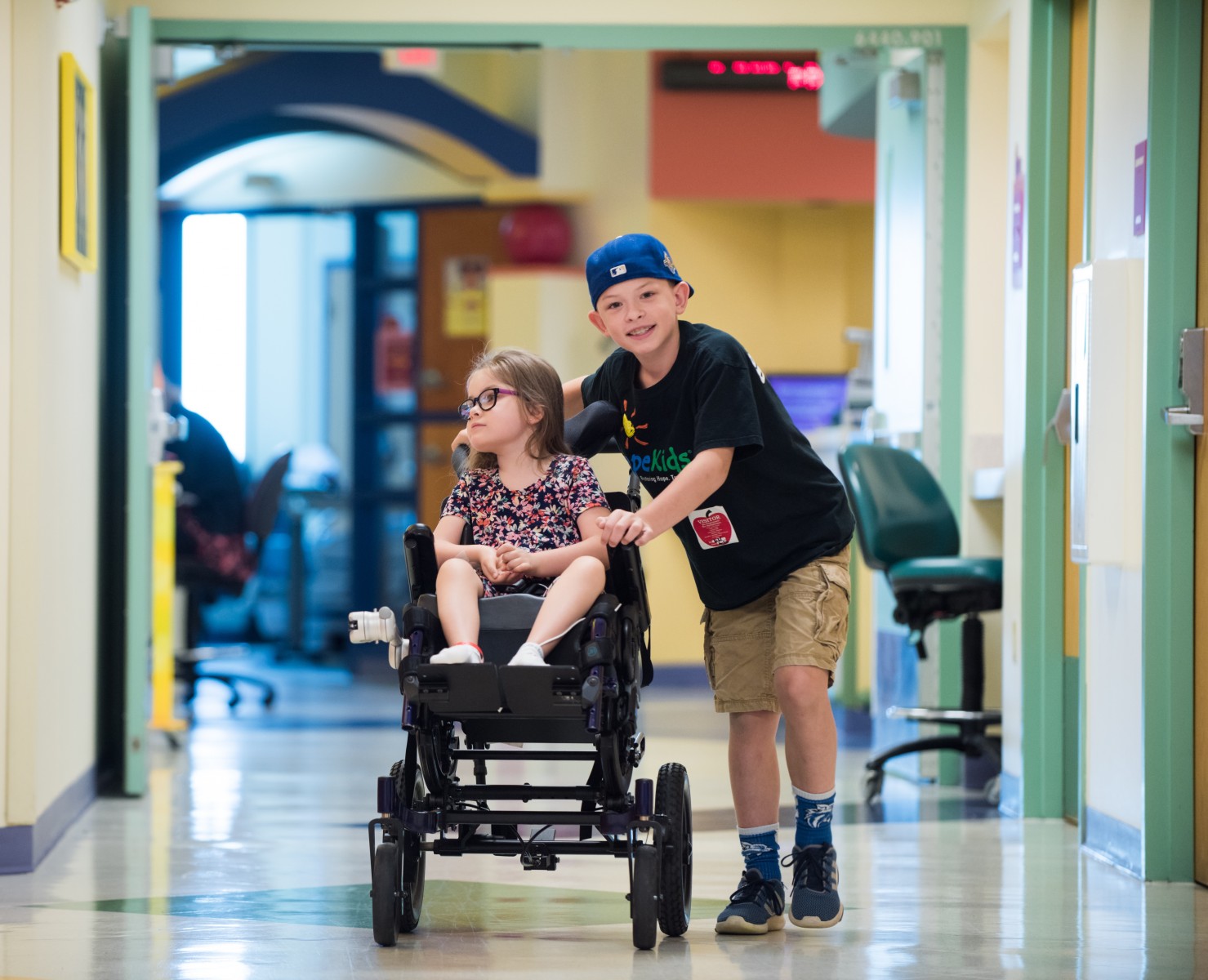Beacon Program Provides Comprehensive Care for Kids with Complex Conditions
Angie Cunningham vividly remembers the day her daughter Quinn was diagnosed with Rett Syndrome, a progressively debilitating neurodevelopmental disorder.
“I cried for the next two days,” Angie said. “It was devastating news.”
But after the initial shock wore off, Angie and her husband, Ryan, decided no matter what Quinn’s diagnosis, they weren’t going to let it stop their family from living life to the fullest. And thanks to help from family, friends and the Children’s Mercy Beacon Program, they haven’t.
Living with Rett Syndrome
Angie will readily admit that having a child diagnosed with Rett Syndrome makes life complicated. This rare neurodevelopmental disorder begins to show its affects in infancy or early childhood, and is seen almost exclusively in females.
“Quinn never really progressed well from the beginning,” Angie said. “She didn’t reach developmental milestones like other children. It was a big deal for her to roll over, and she had problems sitting up.”
Eventually, Quinn lost the ability to use her hands, and though she began to develop language skills, saying mama, dada and bubba, those soon began to slip away, too.
At about 15 months old, DNA testing confirmed that Quinn has the genetic mutation responsible for Rett Syndrome. The mutation results in a shortage or absence of a normal protein needed to regulate or direct other genes which affect or control the normal development of select regions of the brain.
In addition to problems with hand movements and communication, most children diagnosed with Rett Syndrome experience respiratory issues, feeding problems/constipation, anxiety and epilepsy/seizures. Most of these children require help with every aspect of daily living.
Beacon Program Cares for Kids with Complex Health Problems
Quinn with her brother Ayden
Quinn is no exception to that rule. She is non-verbal, requires a wheelchair and has a feeding tube. By age 3, her care became increasingly complicated. That’s when the family’s pediatrician referred her to the Children’s Mercy Beacon Program.
The program cares for children with complex or systemic medical problems. Providers coordinate complex care for hundreds of children from birth to age 21 diagnosed with medical complexities, and their healthy siblings, all in a multidisciplinary setting. The goal is to reduce hospitalizations and help patients live their lives to the fullest.
Emily Goodwin, MD, Beacon Program physician, cares for Quinn and her 10-year-old brother, Ayden, who is healthy.
“We were very excited to learn about the Beacon Program,” Angie said. “Dr. Goodwin is amazing!” One of the first things she did was help stabilize Quinn’s respiratory condition.
“Quinn was hospitalized 16 times in 2015 for respiratory problems,” Angie said. “But with Dr. Goodwin’s help, we haven’t had any recent hospitalizations for a respiratory diagnosis.”
Quinn also has experienced severe constipation, another common problem for Rett Syndrome patients. To help with that, Dr. Goodwin referred her to John Rosen, MD, a pediatric gastroenterologist at Children’s Mercy.
“Dr. Rosen recommended a cecostomy for Quinn, and it’s worked wonderfully,” Angie said. A cecostomy is a thin tube inserted in the first part of the large bowel and used to administer an enema to quickly and completely empty the large intestines.
Now the Harrisonville, Mo., family is focusing on getting Quinn help with increasingly frequent seizures.
Her pediatric neurologists, Jean-Baptiste Le Pichon, MD, PhD, and Ara Hall, MD, have recommended the ketogenic diet, an effective non-medication treatment for intractable epilepsy.
Children’s Mercy has one of the largest ketogenic diet programs in the U.S. Families are supported by a team through every step of the ketogenic process.
“We’re hoping the ketogenic diet will help reduce the number and severity of Quinn’s seizures,” Angie said.
Best Doctors in Our Back Pocket
In the three years since Quinn first came to see Dr. Goodwin at the Beacon Program, her health is much, much better. Ayden has benefited from routine check-ups with the team, and Angie appreciates the multidisciplinary approach the program takes, making the specialists and services Quinn and Ayden need readily available.
“Quinn and Ayden see Dr. Goodwin every six months, but it seems like we either see or talk with her every couple of weeks, and she is always very accessible,” Angie said. “We think of the Beacon team as an extended part of our family,” Angie added.
And though Quinn has many physical challenges, the Cunninghams say she is just like any other 6-year-old girl. She loves princesses, swimming, the beach and just lying on the floor giggling with her brother.
“Quinn has been to Hawaii twice. She goes to her brother’s ballgames and is very active,” Angie added, “but with her medical condition, we know that can change at a moment’s notice.
“It’s a comfort to know the Beacon team is just a phone call away, and that we have the best doctors right in our back pocket when we need them.”
Learn more about the Beacon Program at Children's Mercy.
Learn more about the Division of Pediatric Gastroenterology at Children's Mercy.
Learn more about the Ketogenic Diet Program at Children's Mercy.


